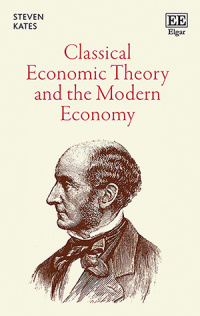Paperback
Classical Economic Theory and the Modern Economy
Economic theory reached its zenith of analytical power and depth of understanding in the middle of the nineteenth century among John Stuart Mill and his contemporaries. This book explains what took place in the ensuing Marginal Revolution and Keynesian Revolution that left economists less able to understand how economies operate. It explores the false mythology that has obscured the arguments of classical economists, providing a pathway into the theory they developed.
More Information
Critical Acclaim
Contents
More Information
Economic theory reached its highest level of analytical power and depth in the middle of the nineteenth century among John Stuart Mill and his contemporaries. This book explains classical economics when it was at its height, followed by an analysis of what took place as a result of the ensuing Marginal and Keynesian Revolutions that have left economists less able to understand how economies operate.
The chapters explore the false mythology that has obscured the arguments of classical economists, clouding to the point of near invisibility the theories they had developed. Steven Kates offers a thorough understanding of the operation of an economy within a classical framework, providing a new perspective for viewing modern economic theory from the outside. This provocative book not only explains the meaning of Say’s Law in an accessible way, but also the origins of the Keynesian revolution and Keynes’s pathway in writing The General Theory. It provides a new look at the classical theory of value at its height that was not based, as so many now wrongly believe, on the labour theory of value.
A crucial read for economic policy makers seeking to understand the operation of a market economy, this book should also be of keen interest to economists generally as well as scholars in the history of economic thought.
The chapters explore the false mythology that has obscured the arguments of classical economists, clouding to the point of near invisibility the theories they had developed. Steven Kates offers a thorough understanding of the operation of an economy within a classical framework, providing a new perspective for viewing modern economic theory from the outside. This provocative book not only explains the meaning of Say’s Law in an accessible way, but also the origins of the Keynesian revolution and Keynes’s pathway in writing The General Theory. It provides a new look at the classical theory of value at its height that was not based, as so many now wrongly believe, on the labour theory of value.
A crucial read for economic policy makers seeking to understand the operation of a market economy, this book should also be of keen interest to economists generally as well as scholars in the history of economic thought.
Critical Acclaim
‘Classical Economic Theory and the Modern Economy should be a welcome addition to the reading lists of both amateurs and professional economists, whether one’s interest is in macroeconomics or the history of economic thought. Although the book is a worthwhile read on its own without familiarity with Kates’s work, this reviewer believes it really shines when read as a sequel and conclusion to the author’s previous contributions.’
– Per L Bylund, The Quarterly Journal of Austrian Economics
‘In Classical Economic Theory and the Modern Economy, Kates seeks to correct this dangerous intellectual detour economists took due to Keynes and finally get modern economists to practice economics beyond the shadow of Keynes. It is a Herculean task, but armed with J.B. Say and especially J.S. Mill, Steven Kates makes as strong an effort for resurrection of classical economy theory as can be marshaled. This will be a must read for all students of economics, and a compelling contribution to the history of economic doctrine.’
– Peter Boettke, George Mason University, US
‘This book delivers hard blows to the tenets of modern economics, retells its history and evolution, and pokes holes at our misperceptions of classical economic theory. The result is as much a burial of the macroeconomics of Keynes as it is a resuscitation of the classical economics of J.S. Mill.’
– Per Bylund, Oklahoma State University, US
– Per L Bylund, The Quarterly Journal of Austrian Economics
‘In Classical Economic Theory and the Modern Economy, Kates seeks to correct this dangerous intellectual detour economists took due to Keynes and finally get modern economists to practice economics beyond the shadow of Keynes. It is a Herculean task, but armed with J.B. Say and especially J.S. Mill, Steven Kates makes as strong an effort for resurrection of classical economy theory as can be marshaled. This will be a must read for all students of economics, and a compelling contribution to the history of economic doctrine.’
– Peter Boettke, George Mason University, US
‘This book delivers hard blows to the tenets of modern economics, retells its history and evolution, and pokes holes at our misperceptions of classical economic theory. The result is as much a burial of the macroeconomics of Keynes as it is a resuscitation of the classical economics of J.S. Mill.’
– Per Bylund, Oklahoma State University, US
Contents
Contents: Introduction 1. The Purpose of this Book and Why Only I could Write It 2. The Background 3. The Keynesian Revolution and Classical Theory 4. Understanding Classical Presuppositions, Terminology and Concepts 5. The Classical Theory of Value and the Marginal Revolution 6. Keynesian Theory Overruns the Classics 7. The Basis for Keynes’s Success: Why Keynes was Able to Succeed 8. Classical Theory and the Role of Government 9. Austrian Economics and Classical 10. An Overview of Classical Economic Theory Afterword Bibliography Index
